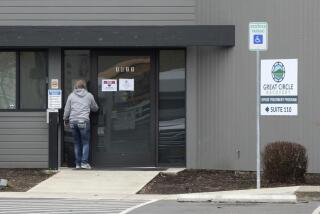Dreams of Riches Fade as Oregon Lottery Sales Lag
- Share via
PORTLAND, Ore. — The only lottery advertised on Oregon television these days is the Washington State Lottery.
It isn’t that Oregon does not have a lottery of its own. It’s just that the Oregon Lottery cannot afford to buy TV advertising time.
Voters here approved their lottery on the same election date--Nov. 6, 1984--as Californians approved theirs, but most parallels end there.
The California Lottery has exceeded even the most optimistic expectations. Sales for the first full year of operation should more than double original predictions, coming in at more than $2 billion--about $75 for every man, woman and child in the state--breaking all North American records.
But in Oregon, where lottery officials had once forecast sales of as much as $129 million during the 1985-1986 fiscal year, the actual figure is now expected to be no more than $92 million, or $34 per capita.
The shortfall in Oregon means more than disappearing television commercials. Many of the economic development projects to be financed by lottery revenues--roads, small business loans, reforestation projects, industrial promotion campaigns and the like--have been delayed or abandoned. That, in turn, has led to feuding, finger-pointing and political squabbles.
‘A Cruel Hoax’
“It’s been a cruel hoax,” said Oregon state Senate President John Kitzhaber, a Democrat. “We trusted their predictions without any prior experience in a lottery, and then we spent every dollar.”
“It was oversold to everybody,” said Vera Katz, the Democratic Speaker of the Oregon House. “It just isn’t going to produce.”
“It’s a sham,” echoed Jeanette Hamby, a Republican state senator.
Critics, and they are legion, offer a variety of explanations as to what went wrong--explanations ranging from the view that Oregonians have an anti-gambling philosophy to charges of mismanagement by lottery officials.
But the most popular explanation is that Oregon cannot compete effectively with the lotteries of its larger neighbors--especially Washington.
Most of the lottery sales in Oregon and Washington are in the lotto games--authorized versions of the illegal “numbers games” that have flourished on the streets of America for generations.
In lotto, the size of the jackpot is largely dependent on the number of people who play. Oregon has a population of 2.67 million, Washington about 4.38 million. In Washington, the top lotto jackpot thus far has been $8.5 million; in Oregon, $1.5 million.
And, as Mark Michalko, director of the California Lottery, noted, “It’s the bigger jackpots that attract the players.”
More than half of Oregon’s residents live within an hour’s drive of the Washington border, most of them in and around Portland.
Minutes to Vancouver
The trip from downtown Portland to Vancouver, Wash., takes about 10 minutes via the bridge over the Columbia River on Interstate 5. If you take the first exit on the Washington side and turn left, the first place you see is the B-Mart, a convenience store that sells more Washington lottery tickets than any other outlet in the state.
“We’re the most successful because we’re so close to Oregon,” said Peggy Curtis, assistant manager of the B-Mart, which averages $80,000 worth of lottery business a week. “They come over here because we pay off better. I’d estimate that 95% to 99% of our business is from Oregon.”
If her estimate is correct, it means that sales of Washington lottery tickets to Oregonians at the B-Mart are greater than sales of Oregon lottery tickets at any outlet in Oregon.
“When we have a big jackpot--like when it was over $8 million back in March--the people lined up outside the store, waiting their turn. Some of them waited an hour, an hour and a half, to buy tickets,” said Kathy Slattery, a B-Mart clerk.
Washington State Lottery television commercials are the only ones that Oregon viewers see right now, because the shortfall in revenues has forced cancellation of all TV advertising by the Oregon Lottery.
“When you’re in trouble, you want to advertise,” said lottery Director Robert Smith, a budget analyst for Gov. Victor Atiyeh, a Republican, before Atiyeh appointed him lottery director. “But with sales down, we had no choice.”
As in other states, the division of lottery sales revenue in Oregon is mandated by law. In Oregon, 50% goes for prizes, 34% for economic development and 16% for the lottery staff to spend on administration, promotion and marketing.
In the three months that followed the start-up of the Oregon Lottery in April, 1985, sales matched expectations, and Smith spent accordingly in running and promoting the games. The expenditures continued apace throughout the year, but the sales did not. By early January, Smith’s administrative budget ran several hundred thousand dollars in the red.
On Jan. 28, the Oregon Lottery Commission approved a $1.7-million administrative cost-cutting package that included reductions in personnel, services and supplies and a $1.3-million slash in the advertising and promotion budget.
The falling sales raised questions among Oregon’s legislators as to why the lottery, which had begun with such promise, was failing to live up to original expectations.
Smith concedes that competition from the Washington lottery was more than expected, but he thinks there is more to it than that.
“Perhaps Oregonians themselves are different,” he said. “They’re liberals in some areas, but conservative in others.”
“Even though they voted for the lottery . . . I just don’t think Oregonians really buy into it,” said Debs Potts, 78, chairman of the state Lottery Commission.
Kitzhaber and John Whitty, a Democratic state representative from Coos Bay, are two lottery critics who take a harsher view and are quick to criticize the Republican Atiyeh Administration for its handling of the lottery.
‘Doing a Lousy Job’
“They’re doing a lousy job,” Whitty said. “The cuts in advertising were penny-wise and pound-foolish. They should have cut out more dead wood instead.”
Kitzhaber likes to point out that Smith had no experience running a lottery before he was appointed to head the Oregon operation.
“Bob (Smith) was just another guy with the governor’s office,” Kitzhaber said. “Potts (a 24-year veteran of the Oregon Legislature, and a Democrat) is part of the good-old-boy network. I don’t know what those people know about lotteries.”
Atiyeh’s press secretary, Denny Miles, responded by noting that Smith had served various governors of both parties and that Potts “is one of the most respected lawmakers in the state.” However, Miles did not dispute the point that neither man had previous lottery experience.
And Michalko, who was legal counsel for the Ohio Lottery when Gov. George Deukmejian appointed him to head the California game, said he thinks such experience is important.
“We imported a lot of expertise; I don’t think they did,” said Michalko, who raided the lotteries of several other states while staffing his California Lottery. “I don’t think we would have succeeded without experienced people.”
Michalko said the recession that hit Oregon’s timber, agriculture and fishing industries may have reduced the disposable income available for playing the lottery. But he also suggested that California sales probably benefit from the fact that government proceeds are earmarked for education while the government’s share in Oregon goes to something as loosely defined as “economic development.”
“I don’t think Californians play because our money is going to education, but they feel that, even if they don’t win, their money is going for some specific, worthwhile purpose. I don’t think they feel that way in Oregon about money going to some less definable cause,” he said.
Trouble With Definition
The Oregon Legislature even had trouble defining “economic development” when it came time last year to decide on the division of anticipated lottery profits. After considerable wrangling, legislators settled on a compromise that earmarked 38% of the state’s share for education; 27% for public works like roads, mass transit and forestry projects; 17.5% for loans and grants to businesses, and 17.5% for marketing and promotion of the state’s industries.
When the revenues came up short, the legislature decided to give education most of its cut, while trimming or eliminating everything else. Seemingly, nobody was satisfied.
“We’ve got 17% unemployment in Coos Bay, and they’ve only given us $190,000 so far,” Whitty said. “Heck, we spent more than that on lottery tickets.”
The lottery commissioners admit that there have been mistakes--especially in the revenue projections--but they say that there is no way to make everybody happy.
Smith said the trims made in January should put the administrative budget back in the black within a few months, and Commissioner David L. Witt has suggested creation of a contingency fund so that advertising can be continued in the event of another drop in sales.
In an effort to increase revenues, the commission has increased the odds in the lotto game, requiring jackpot winners to pick six numbers out of 42, instead of six out of 38. The higher odds should make it more difficult to win. That should boost the size of the jackpots, and, theoretically, that should boost sales.
“Lotto will grow,” Smith said. “Revenues will improve. The advertising will come back in full. . . .
More to Read
Sign up for Essential California
The most important California stories and recommendations in your inbox every morning.
You may occasionally receive promotional content from the Los Angeles Times.










